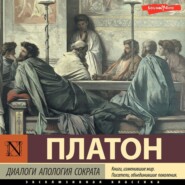По всем вопросам обращайтесь на: info@litportal.ru
(©) 2003-2025.
✖
The Republic
Настройки чтения
Размер шрифта
Высота строк
Поля
Yes.
And everything else on the style?
Yes.
Then beauty of style and harmony and grace and good rhythm depend on simplicity, – I mean the true simplicity of a rightly and nobly ordered mind and character, not that other simplicity which is only an euphemism for folly?
Very true, he replied.
And if our youth are to do their work in life, must they not make these graces and harmonies their perpetual aim?
They must.
And surely the art of the painter and every other creative and constructive art are full of them, – weaving, embroidery, architecture, and every kind of manufacture; also nature, animal and vegetable, – in all of them there is grace or the absence of grace. And ugliness and discord and inharmonious motion are nearly allied to ill words and ill nature, as grace and harmony are the twin sisters of goodness and virtue and bear their likeness.
That is quite true, he said.
But shall our superintendence go no further, and are the poets only to be required by us to express the image of the good in their works, on pain, if they do anything else, of expulsion from our State? Or is the same control to be extended to other artists, and are they also to be prohibited from exhibiting the opposite forms of vice and intemperance and meanness and indecency in sculpture and building and the other creative arts; and is he who cannot conform to this rule of ours to be prevented from practising his art in our State, lest the taste of our citizens be corrupted by him? We would not have our guardians grow up amid images of moral deformity, as in some noxious pasture, and there browse and feed upon many a baneful herb and flower day by day, little by little, until they silently gather a festering mass of corruption in their own soul. Let our artists rather be those who are gifted to discern the true nature of the beautiful and graceful; then will our youth dwell in a land of health, amid fair sights and sounds, and receive the good in everything; and beauty, the effluence of fair works, shall flow into the eye and ear, like a health-giving breeze from a purer region, and insensibly draw the soul from earliest years into likeness and sympathy with the beauty of reason.
There can be no nobler training than that, he replied.
And therefore, I said, Glaucon, musical training is a more potent instrument than any other, because rhythm and harmony find their way into the inward places of the soul, on which they mightily fasten, imparting grace, and making the soul of him who is rightly educated graceful, or of him who is ill-educated ungraceful; and also because he who has received this true education of the inner being will most shrewdly perceive omissions or faults in art and nature, and with a true taste, while he praises and rejoices over and receives into his soul the good, and becomes noble and good, he will justly blame and hate the bad, now in the days of his youth, even before he is able to know the reason why; and when reason comes he will recognise and salute the friend with whom his education has made him long familiar.
Yes, he said, I quite agree with you in thinking that our youth should be trained in music and on the grounds which you mention.
Just as in learning to read, I said, we were satisfied when we knew the letters of the alphabet, which are very few, in all their recurring sizes and combinations; not slighting them as unimportant whether they occupy a space large or small, but everywhere eager to make them out; and not thinking ourselves perfect in the art of reading until we recognise them wherever they are found:
True —
Or, as we recognise the reflection of letters in the water, or in a mirror, only when we know the letters themselves; the same art and study giving us the knowledge of both:
Exactly —
Even so, as I maintain, neither we nor our guardians, whom we have to educate, can ever become musical until we and they know the essential forms of temperance, courage, liberality, magnificence, and their kindred, as well as the contrary forms, in all their combinations, and can recognise them and their images wherever they are found, not slighting them either in small things or great, but believing them all to be within the sphere of one art and study.
Most assuredly.
And when a beautiful soul harmonizes with a beautiful form, and the two are cast in one mould, that will be the fairest of sights to him who has an eye to see it?
The fairest indeed.
And the fairest is also the loveliest?
That may be assumed.
And the man who has the spirit of harmony will be most in love with the loveliest; but he will not love him who is of an inharmonious soul?
That is true, he replied, if the deficiency be in his soul; but if there be any merely bodily defect in another he will be patient of it, and will love all the same.
I perceive, I said, that you have or have had experiences of this sort, and I agree. But let me ask you another question: Has excess of pleasure any affinity to temperance?
How can that be? he replied; pleasure deprives a man of the use of his faculties quite as much as pain.
Or any affinity to virtue in general?
None whatever.
Any affinity to wantonness and intemperance?
Yes, the greatest.
And is there any greater or keener pleasure than that of sensual love?
No, nor a madder.
Whereas true love is a love of beauty and order – temperate and harmonious?
Quite true, he said.
Then no intemperance or madness should be allowed to approach true love?
Certainly not.
Then mad or intemperate pleasure must never be allowed to come near the lover and his beloved; neither of them can have any part in it if their love is of the right sort?
No, indeed, Socrates, it must never come near them.
Then I suppose that in the city which we are founding you would make a law to the effect that a friend should use no other familiarity to his love than a father would use to his son, and then only for a noble purpose, and he must first have the other's consent; and this rule is to limit him in all his intercourse, and he is never to be seen going further, or, if he exceeds, he is to be deemed guilty of coarseness and bad taste.
I quite agree, he said.
Thus much of music, which makes a fair ending; for what should be the end of music if not the love of beauty?
I agree, he said.
After music comes gymnastic, in which our youth are next to be trained.
Certainly.
Gymnastic as well as music should begin in early years; the training in it should be careful and should continue through life. Now my belief is, – and this is a matter upon which I should like to have your opinion in confirmation of my own, but my own belief is, – not that the good body by any bodily excellence improves the soul, but, on the contrary, that the good soul, by her own excellence, improves the body as far as this may be possible. What do you say?
Yes, I agree.
Then, to the mind when adequately trained, we shall be right in handing over the more particular care of the body; and in order to avoid prolixity we will now only give the general outlines of the subject.
Very good.
That they must abstain from intoxication has been already remarked by us; for of all persons a guardian should be the last to get drunk and not know where in the world he is.

















